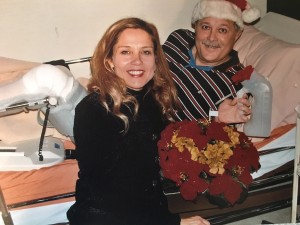 Almost five decades ago, the classic 1975 movie, “One Flew Over the Cuckoo’s Nest,” won all five major Academy Awards. The poignant drama chronicled the plight of young Jack Nicholson’s character Randle McMurphy who was confined to a state mental institution. This was not a Utopian facility where the nurses and doctors were lovers of people, or even keepers of the Hippocratic Oath. Instead, this description of life in a psychiatric facility vividly depicted the horrors of the treatment of some patients before mental health reforms.
Almost five decades ago, the classic 1975 movie, “One Flew Over the Cuckoo’s Nest,” won all five major Academy Awards. The poignant drama chronicled the plight of young Jack Nicholson’s character Randle McMurphy who was confined to a state mental institution. This was not a Utopian facility where the nurses and doctors were lovers of people, or even keepers of the Hippocratic Oath. Instead, this description of life in a psychiatric facility vividly depicted the horrors of the treatment of some patients before mental health reforms.
Especially noteworthy in the film was the late actress Louise Fletcher’s 1976 Oscar winning portrayal of the brutally hardhearted and dictatorial Nurse Ratched. This fictional character is everything a good nurse would never want to be. The American Film Institute designated Ratched as the fifth greatest film villain of all time in their series 100 Years…100 Heroes & Villains. Today, her criminal treatment of patients would be grounds for a medical malpractice suit of dynamic proportions.
Although I don’t think I’m as bad as Mildred Ratched, I must confess that I possess no aptitude for medical practices. I have a queasy stomach and am rather lacking on the virtue of patience. Therefore, caregiving was definitely not at the top of my list for life tasks. Yet a decade ago, while caregiving for my husband following his third major surgery in eight months, I received an email addressed to “Nurse Ratchet.” The sender, a longtime friend had misspelled the sadistic caregiver’s name, but I knew instantly who she was referring to.
Despite my lack of nursing skills, like many other spouses and adult children, the lot of temporary caregiving had fallen on my shoulders. In light of this, I promised a registered nurse who really is a modern-day Florence Nightingale, that when I made it through my season of caregiving, I would compile a list of practical tips for others facing the daunting task.
Nurse Ratched’s Tips for Caregivers:
First, a caregiver must determine to maintain his or her sense of humor, be organized, and carefully prepare for this awesome responsibility. If possible, find a way to make the room where your loved one will be recuperating as dark as possible during daylight hours. This does not mean that you cannot shower your “sickie” with sunshine if they desire. But when pain or discomfort has kept them up during the midnight hours, window coverings will help simulate nighttime so they can rest. (This way, the caregiver can rest, too.) To avoid unnecessary expense, you can purchase used drapes to cover windows at a thrift store or garage sale.
Second, check with your physician’s office about the medical equipment that will be required. If a hospital bed is necessary, have it in place before your charge arrives home. Stock up on other supplies such as a walker, cane, crutches, shower seat, etc. and even prescriptions. Fill your cupboards and refrigerator with non-perishable groceries and bottled water since it might be quite a while before you will be able to leave your patient unattended. Prepare a journal to record administered medications, treatments, and even meals to avoid confusion.
required. If a hospital bed is necessary, have it in place before your charge arrives home. Stock up on other supplies such as a walker, cane, crutches, shower seat, etc. and even prescriptions. Fill your cupboards and refrigerator with non-perishable groceries and bottled water since it might be quite a while before you will be able to leave your patient unattended. Prepare a journal to record administered medications, treatments, and even meals to avoid confusion.
Then there is entertainment to think about since the most difficult patient is a bored patient. Make sure a television with a remote can be readily viewed from the hospital bed. Plan a pre-op trip to your local library, to check out interesting books and make a must-see list for movies. When consulting with medical professionals, write down the questions you want to ask and request any resources that might be available for your situation. Don’t try to be superman or superwoman, but whenever possible ask for assistance from relatives, friends, or your church by communicating your specific needs.
 The caregiver has to get out and you can’t allow self-imposed guilt to keep you from taking care of yourself. Exercise, eat right, sleep whenever possible, and remember that “this too shall pass.” Most of all, forgive yourself when your attitude turns sour or when you get overwhelmed. Plus, forgive the world for moving full speed ahead and forgetting about your difficult situation. The flowers, cards, calls, and visits will probably trickle off rather quickly, since life goes on.
The caregiver has to get out and you can’t allow self-imposed guilt to keep you from taking care of yourself. Exercise, eat right, sleep whenever possible, and remember that “this too shall pass.” Most of all, forgive yourself when your attitude turns sour or when you get overwhelmed. Plus, forgive the world for moving full speed ahead and forgetting about your difficult situation. The flowers, cards, calls, and visits will probably trickle off rather quickly, since life goes on.
If you are a long-term caregiver like millions of Americans, finding a support group could provide a vital network to alleviate the stress and isolation this responsibility can create. But if you become severely depressed seek professional counseling. After the caregiving season ends, some caregivers also experience a temporary depression unsure of their next purpose. Hopefully, this won’t last long, because life has a way of continually presenting us with new tasks and adventures.
 Christina Ryan Claypool is an award-winning freelance journalist and inspirational speaker. She has been featured on CBN’s 700 Club and Joyce Meyer Ministries Enjoying Everyday Life TV show. Her latest book, “Secrets of the Pastor’s Wife: A Novel” is available on all major online outlets. Contact her through her website at www.christinaryanclaypool.com.
Christina Ryan Claypool is an award-winning freelance journalist and inspirational speaker. She has been featured on CBN’s 700 Club and Joyce Meyer Ministries Enjoying Everyday Life TV show. Her latest book, “Secrets of the Pastor’s Wife: A Novel” is available on all major online outlets. Contact her through her website at www.christinaryanclaypool.com.













 It was our last lunch together. My friend Kimberly had an aggressive form of cancer and knew her time was short. I hadn’t accepted the fact yet, because she was only in her early forties and had a loving husband and three children to finish raising. But she couldn’t fight anymore.
It was our last lunch together. My friend Kimberly had an aggressive form of cancer and knew her time was short. I hadn’t accepted the fact yet, because she was only in her early forties and had a loving husband and three children to finish raising. But she couldn’t fight anymore.


 What does a cup of coffee have to do with grace? Well, the Bible mentions numerous occasions when Jesus was found engaging with some rather questionable characters. For example, he recruited Matthew, a greedy tax collector to be a disciple, and the hot-tempered and outspoken Peter to lead His rather motley crew. Then at a public supper, the Messiah allowed a woman referred to as an “especially wicked sinner” to wash his feet with her tears. You can bet that this caused quite a stir.
What does a cup of coffee have to do with grace? Well, the Bible mentions numerous occasions when Jesus was found engaging with some rather questionable characters. For example, he recruited Matthew, a greedy tax collector to be a disciple, and the hot-tempered and outspoken Peter to lead His rather motley crew. Then at a public supper, the Messiah allowed a woman referred to as an “especially wicked sinner” to wash his feet with her tears. You can bet that this caused quite a stir. scandalous nature of God’s grace in a personal way. After all, like the famous scholar, I, too, am a Ragamuffin since Christ’s grace came to me in 1986 while I was a young patient on a psychiatric ward battling substance abuse and depression. In those days, I had a college friend that I will refer to as “Jennifer” who tried to rescue me by faithfully taking me to her church, because she had also struggled with addiction. More than two decades ago, it was Jennifer’s pastor who stood at my hospital bedside on the psychiatric floor praying that God would heal my broken life.
scandalous nature of God’s grace in a personal way. After all, like the famous scholar, I, too, am a Ragamuffin since Christ’s grace came to me in 1986 while I was a young patient on a psychiatric ward battling substance abuse and depression. In those days, I had a college friend that I will refer to as “Jennifer” who tried to rescue me by faithfully taking me to her church, because she had also struggled with addiction. More than two decades ago, it was Jennifer’s pastor who stood at my hospital bedside on the psychiatric floor praying that God would heal my broken life.



 I never thought much about birds, certainly not Cardinals. Undoubtedly, the males with their brilliant red feathers are eye-catching. Yet not that long ago, I believed that collecting bird memorabilia was better left to those with little to do. Now a few Cardinal keepsakes have found their way into my home.
I never thought much about birds, certainly not Cardinals. Undoubtedly, the males with their brilliant red feathers are eye-catching. Yet not that long ago, I believed that collecting bird memorabilia was better left to those with little to do. Now a few Cardinal keepsakes have found their way into my home.

 Not so much desiring material things, rather missing the everyday blessings that are easy to take for granted. Then there are folks who seem to be naturally thankful for everything. “Gratitude is inclusive,” writes the late author Brennan Manning. For example, in his book, “Ruthless Trust” Manning shares about an Alcoholics Anonymous meeting, where a man named Tony once said, “If I had to choose among all the diseases that afflict human beings, I would choose mine [alcoholism], because I can do something about it.”
Not so much desiring material things, rather missing the everyday blessings that are easy to take for granted. Then there are folks who seem to be naturally thankful for everything. “Gratitude is inclusive,” writes the late author Brennan Manning. For example, in his book, “Ruthless Trust” Manning shares about an Alcoholics Anonymous meeting, where a man named Tony once said, “If I had to choose among all the diseases that afflict human beings, I would choose mine [alcoholism], because I can do something about it.”
